Describe Your Main Character Sheet
Describe your Main Character sheet
Skin
Tone: Pale, Rosy, Olive, Dark, Tanned, Alabaster, Ebony, Bronze, Golden, Fair
Texture: Smooth, Rough, Silky, Coarse, Flaky, Supple, Wrinkled, Calloused, Bumpy
Condition: Moles, Acne, Dry, Greasy, Freckled, Scars, Birthmarks, Bruised, Sunburned, Flawless
Complexion: Clear, Ruddy, Sallow, Glowing, Dull, Even-toned, Blotchy
Eyes
Size: Small, Large, Average, Tiny, Bulging, Narrow
Color: Grey, Brown, Blue, Violet, Pink, Green, Gold, Hazel, Crimson, Amber, Turquoise, Sapphire, Onyx
Shape: Doe-eyed, Almond, Close-set, Wide-set, Round, Oval, Hooded, Monolid
Expression: Deep-set, Squinty, Monolid, Heavy eyelids, Upturned, Downturned, Piercing, Gentle, Sparkling, Steely
Other: Glassy, Bloodshot, Tear-filled, Clear, Glinting, Shiny
Hair
Thickness: Thin, Thick, Fine, Normal
Texture: Greasy, Dry, Soft, Shiny, Curly, Frizzy, Wild, Unruly, Straight, Smooth, Wavy, Floppy
Length: Cropped, Pixie-cut, Afro, Shoulder length, Back length, Waist length, Past hip-length, Buzz cut, Bald
Styles: Weave, Hair extensions, Jaw length, Layered, Mohawk, Dreadlocks, Box braids, Faux locks, Braid, Ponytail, Bun, Updo
Color: White, Salt and pepper, Platinum blonde, Golden blonde, Dirty blonde, Blonde, Strawberry blonde, Ash brown, Mouse brown, Chestnut brown, Golden brown, Chocolate brown, Dark brown, Jet black, Ginger, Red, Auburn, Dyed, Highlights, Low-lights, Ombre
Eyebrows: Thin eyebrows, Average eyebrows, Thick eyebrows, Plucked eyebrows, Bushy eyebrows, Arched eyebrows, Straight eyebrows
Lips
Shape: Full, Thin, Heart-shaped, Bow-shaped, Wide, Small
Texture: Chapped, Smooth, Cracked, Soft, Rough
Color: Pale, Pink, Red, Crimson, Brown, Purple, Nude
Expression: Smiling, Frowning, Pursed, Pouting, Curved, Neutral, Tight-lipped, Parted
Nose
Shape: Button, Roman, Hooked, Aquiline, Flat, Pointed, Wide, Narrow, Crooked, Upturned, Snub
Size: Small, Large, Average, Long, Short
Condition: Freckled, Sunburned, Smooth, Bumpy
Build
Frame: Petite, Slim, Athletic, Muscular, Average, Stocky, Large, Lean, Stout, Bony, Broad-shouldered, Narrow-shouldered
Height: Short, Tall, Average, Petite, Giant
Posture: Upright, Slouched, Rigid, Relaxed, Graceful, Awkward, Stiff, Hunched
Hands
Size: Small, Large, Average, Delicate, Strong
Texture: Smooth, Rough, Calloused, Soft, Firm
Condition: Clean, Dirty, Manicured, Scarred, Wrinkled
Nails: Short, Long, Polished, Chipped, Clean, Dirty, Painted, Natural
Voice
Tone: Deep, High, Soft, Loud, Raspy, Melodic, Monotonous, Hoarse, Clear, Gentle
Volume: Loud, Soft, Whispery, Booming, Muted
Pace: Fast, Slow, Steady, Hasty, Measured
Expression: Cheerful, Sad, Angry, Calm, Anxious, Confident, Nervous, Excited, Bored
More Posts from Writersreferencez and Others
One of the best tips for writing descriptions of pain is actually a snippet I remember from a story where a character is given a host of colored pencils and asked to draw an egg.
The character says that there’s no white pencil. But you don’t need a white pencil to draw a white egg. We already know the egg is white. What we need to draw is the luminance of the yellow lamp and the reflection of the blue cloth and the shadows and the shading.
We know a broken bone hurts. We know a knife wound hurts. We know grief hurts. Show us what else it does.
You don’t need to describe the character in pain. You need to describe how the pain affects the character - how they’re unable to move, how they’re sweating, how they’re cold, how their muscles ache and their fingers tremble and their eyes prickle.
Draw around the egg. Write around the pain. And we will all be able to see the finished product.
Some advice for when you’re writing and find yourself stuck in the middle of a scene:
kill someone
ask this question: “What could go wrong?” and write exactly how it goes wrong
switch the POV from your current character to another - a minor character, the antagonist, anyone
stop writing whatever scene you’re struggling with and skip to the next one you want to write
write the ending
write a sex scene
use a scene prompt
use sentence starters
read someone else’s writing
Never delete. Never read what you’ve already written. Pass Go, collect your $200, and keep going.
every writing tip article and their mother: dont ever use adverbs ever!
me, shoveling more adverbs onto the page because i do what i want: just you fucking try and stop me
10 World-Building Aspects You Probably Overlooked
When crafting a fictional world, it's easy to focus on the big picture—epic battles, grand landscapes, and memorable characters. However, it’s also important to flesh out your world-building to create a ‘real’ world. Some aspects to consider when world-building are:
Local Cuisine
Consider the types of food your characters eat and how it reflects their culture, geography, and economy. Unique dishes can reveal societal values and local ingredients.
Currency & Trade
Explore the forms of currency used and the trade systems in place. This can include bartering, precious metals, or unique items as currency, influencing economic interactions.
Timekeeping Practices
Different cultures may have their own methods for measuring time, whether it's a unique calendar system, seasons, or celestial events, affecting daily life and traditions.
Cultural Taboos
Consider the unspoken rules and taboos that govern behavior in your world. These can drive conflict and character motivations, adding depth to societal interactions.
Local Flora and Fauna
Unique plants and animals can shape the environment and influence the culture, whether through medicine, food sources, or as part of local mythology.
Rituals and Festivals
Incorporate unique rituals or festivals that celebrate historical events, seasonal changes, or important life milestones, providing insight into cultural values and traditions.
Language Nuances
Explore dialects, slang, or even the use of sign language that reflects the culture and social dynamics, enriching dialogue and interactions between characters.
Architecture and Housing Styles
The design and materials of buildings can reflect climate, resources, and cultural values. Unique architectural features can tell a story about the society that built them.
Social Hierarchies and Classes
Examine how social structures affect character relationships and interactions. Class distinctions can influence everything from daily life to political power.
Environmental Impact
Consider how the natural environment shapes societal behaviours, resource usage, and conflicts. Climate and geography can drive migration patterns and societal development.
Looking For More Writing Tips And Tricks?
Looking for writing tips and tricks to better your manuscript? Check out the rest of Quillology with Haya; a blog dedicated to writing and publishing tips for authors! Instagram Tiktok
Good tips for writing anything, not just role-plays!!
Common grammatical errors and how to correct them!
your vs. you’re
your: belonging to you. For instance “Is this your bag?”
you’re: an abbreviation of you are. For instance “You’re so nice.”
they’re vs. their vs. there
they’re: an abbreviation of they are. For instance “They’re coming this way.”
their: belonging to a group of people or person of unspecified gender. For instance “This is their classroom.”
there: referring to a place. For instance “Will you follow me over there?”
The word “independent” contains no a’s. Commas can change the whole meaning of a phrase. For instance: Let’s eat grandma! vs. Let’s eat, grandma! A good rule of thumb for comma usage (although not perfect) is to read the sentence aloud. If you find yourself pausing between words, that’s a good indication a comma should be there.
Capitalization Proper nouns should be capitalized. This includes names of people, places, and things. However, other nouns will not need it. For instance: you would capitalize “Susan”, ”New York”, and “Eiffel Tower” because those are proper names, but things like “that girl”, “this city”, and “the structure” wouldn’t need it. The first word of a sentence should also be capitalized!
I hope this helps all of you wonderful writers! Have a lovely day and enjoy your RPing! <3
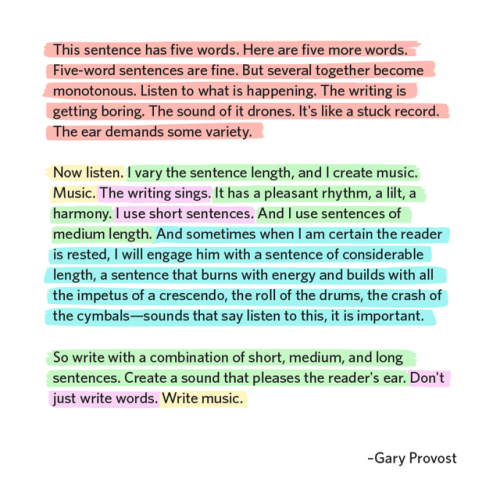
Seven years after, I see you again 😚
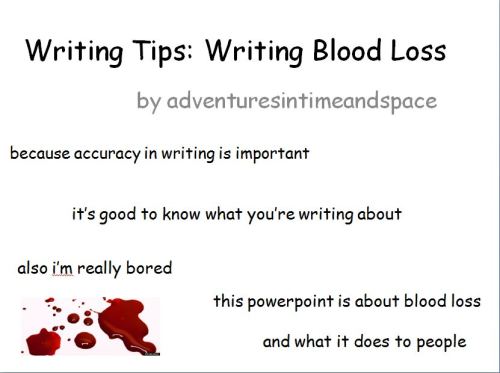
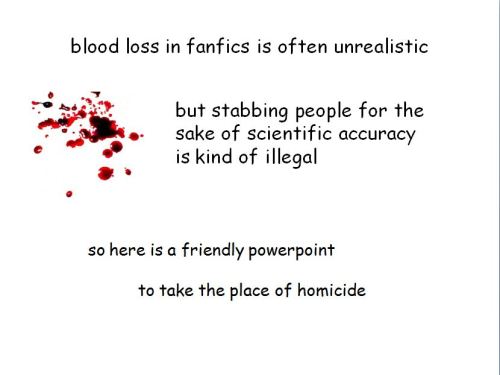

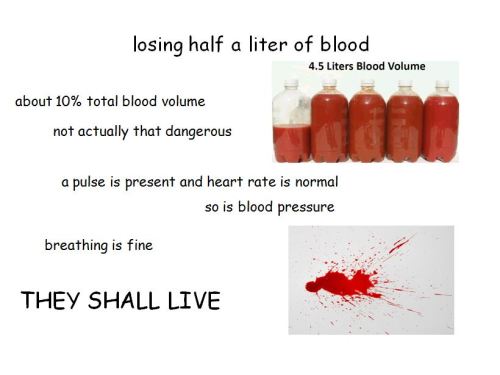
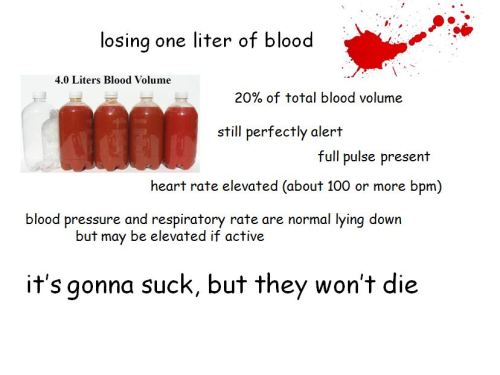
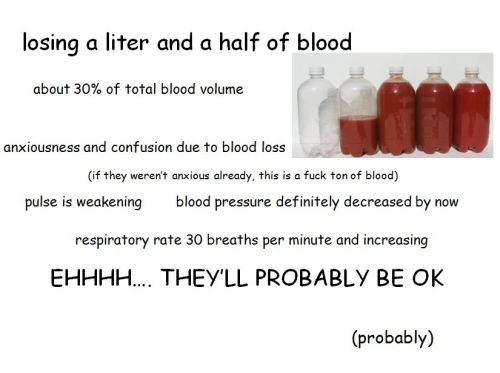



Here are some scientific facts about blood loss for all you psychopaths writers out there.
25 hot traits for your character :
(feel free to use <3 yall gotta agree with me on the 10th, 11th, 12th and from 17th to 21st cus :) tag me yall )
they hold eye contact whenever you talk
they love when you wear their clothes. [hehe]
they get physically clingy whenever they're jealous [ holy god]
always pulls you into a random embrace.
they manspread alot with a sultry gaze >> [imagine that gaze and that fucking smirk]
likes to tease you a lott
or easily blushes when you teach them ♡
holding gazes while kissing your body [highway looks mad comfyy rn]
"look at me when I'm making you feel good, baby" *coughing violently*
vocally expressive, isn't afraid of moaning loud > <
loves keeping you close to them
"if you ask me to fucking kneel, then I would, my love."
clicking their tongue against their cheek when they're mad or jealous !!!!!
kissable lips. sultry gaze, seductive smirk. [weak in em knees fr]
"say that again, mi sol."
loves to showcase you.
always has the top button of their shirt open [banging my head aaaaa]
slightly biting their lower lip when they smile
rolls their tongue over their lips often
sexy fingers !!!!
baby face, raspy and deep voice > \\ <
knows the effects of their actions over you [ do yk my last name?? its *yours* ;) ]
smells good 24/7
multilingual. (now tell me yall dont find multilingual people hot af-)
skilled. an all-rounder irl. smart and skilled, can easily save the world singlehandedly fr
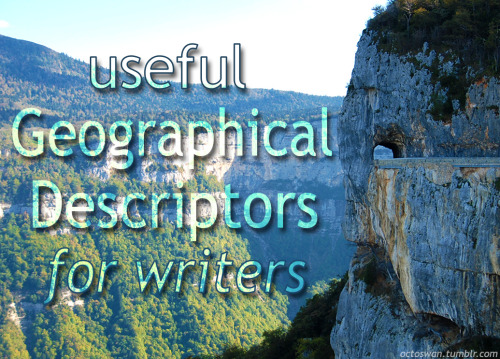


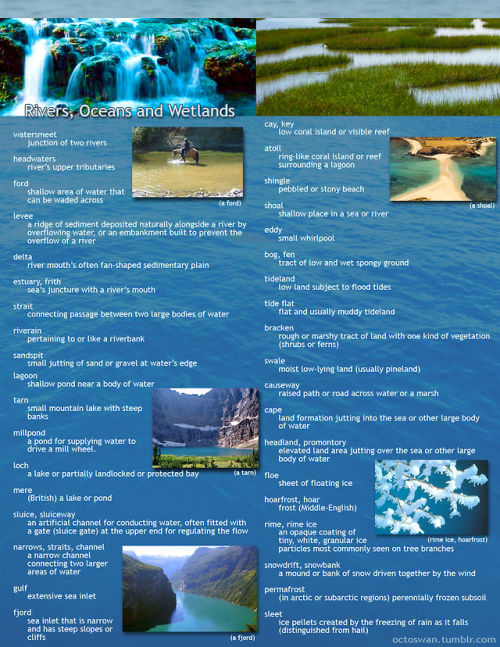
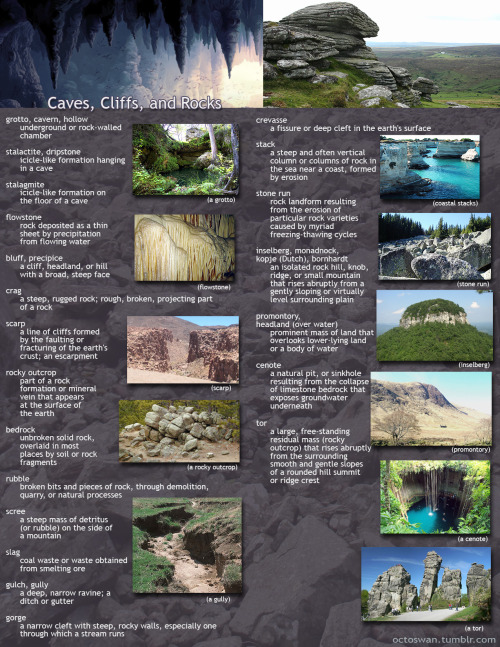
I made these as a way to compile all the geographical vocabulary that I thought was useful and interesting for writers. Some descriptors share categories, and some are simplified, but for the most part everything is in its proper place. Not all the words are as useable as others, and some might take tricky wording to pull off, but I hope these prove useful to all you writers out there!
(save the images to zoom in on the pics)
Words instead of sighed and frowned?
Sighed - let out a deep audible breath or made a similar sound (such as weariness or relief)
Exhaled - breathed out
Heaved - uttered with obvious effort or with a deep breath
Huffed - emitted puffs (as of breath); usually with indignation or scorn
Insufflated - blew on, into, or in (something)
Puffed - blew in short gusts; exhaled forcibly
Snorted - forced air violently through the nose with a rough harsh sound (to express scorn, anger, indignation, or surprise)
Snuffled - breathed through an obstructed nose with a sniffing sound
Suspired - drew a long deep breath; sighed
Frowned - contracted the brow in displeasure or concentration
Glared - stared angrily or fiercely
Glouted - (archaic) frowned, scowled
Glowered - looked or stared with sullen annoyance or anger
Grimaced - distorted one's face in an expression usually of pain, disgust, or disapproval
Loured - looked sullen; frowned
Moue - a twisting of the facial features in disgust or disapproval
Pouted - showed displeasure by thrusting out the lips or wearing a sullen expression
Scoffed - expressed scorn, derision, or contempt
Scowled - contracted the brow in an expression of displeasure
Sulked - silently went about in a bad mood
Hope this helps. If it inspires your writing in any way, please tag me, or send me a link. I would love to read your work!
More: Word Lists ⚜ Writing Resources PDFs
-
 beebooboo6 liked this · 1 week ago
beebooboo6 liked this · 1 week ago -
 dixbolik-bby liked this · 1 week ago
dixbolik-bby liked this · 1 week ago -
 climbinupuraorta liked this · 1 week ago
climbinupuraorta liked this · 1 week ago -
 my-nameis-death reblogged this · 1 week ago
my-nameis-death reblogged this · 1 week ago -
 my-nameis-death liked this · 1 week ago
my-nameis-death liked this · 1 week ago -
 norwes liked this · 1 week ago
norwes liked this · 1 week ago -
 hijabiwriter liked this · 1 week ago
hijabiwriter liked this · 1 week ago -
 dietcherrylemonsundrop liked this · 1 week ago
dietcherrylemonsundrop liked this · 1 week ago -
 themoppets liked this · 1 week ago
themoppets liked this · 1 week ago -
 themoppets reblogged this · 1 week ago
themoppets reblogged this · 1 week ago -
 1nconcievable liked this · 1 week ago
1nconcievable liked this · 1 week ago -
 edengpt liked this · 1 week ago
edengpt liked this · 1 week ago -
 solstice-scribbles reblogged this · 1 week ago
solstice-scribbles reblogged this · 1 week ago -
 fireboaserpent reblogged this · 1 week ago
fireboaserpent reblogged this · 1 week ago -
 fireboaserpent liked this · 1 week ago
fireboaserpent liked this · 1 week ago -
 theoverworkingwriter liked this · 1 week ago
theoverworkingwriter liked this · 1 week ago -
 medeivalpencil liked this · 1 week ago
medeivalpencil liked this · 1 week ago -
 rhaemaya-valwynn liked this · 1 week ago
rhaemaya-valwynn liked this · 1 week ago -
 astudyintheburningofhearts liked this · 1 week ago
astudyintheburningofhearts liked this · 1 week ago -
 edgytraveler liked this · 1 week ago
edgytraveler liked this · 1 week ago -
 phatgirlzgottaeat liked this · 1 week ago
phatgirlzgottaeat liked this · 1 week ago -
 maplehive liked this · 1 week ago
maplehive liked this · 1 week ago -
 wrappeddinplastic liked this · 1 week ago
wrappeddinplastic liked this · 1 week ago -
 adinokid liked this · 1 week ago
adinokid liked this · 1 week ago -
 randomlyrandomperson liked this · 1 week ago
randomlyrandomperson liked this · 1 week ago -
 vmhope liked this · 1 week ago
vmhope liked this · 1 week ago -
 oroiide liked this · 1 week ago
oroiide liked this · 1 week ago -
 crow-winged-wolf liked this · 1 week ago
crow-winged-wolf liked this · 1 week ago -
 kindagaycanofsoup liked this · 1 week ago
kindagaycanofsoup liked this · 1 week ago -
 kbade liked this · 1 week ago
kbade liked this · 1 week ago -
 ang3l-bby888 liked this · 1 week ago
ang3l-bby888 liked this · 1 week ago -
 writingtips4l reblogged this · 1 week ago
writingtips4l reblogged this · 1 week ago -
 longnamenospaces reblogged this · 1 week ago
longnamenospaces reblogged this · 1 week ago -
 ilovewhimperingaudios liked this · 1 week ago
ilovewhimperingaudios liked this · 1 week ago -
 strangetigerperfection reblogged this · 1 week ago
strangetigerperfection reblogged this · 1 week ago -
 strangetigerperfection liked this · 1 week ago
strangetigerperfection liked this · 1 week ago -
 intenebrisobscurat reblogged this · 1 week ago
intenebrisobscurat reblogged this · 1 week ago -
 angellmess liked this · 1 week ago
angellmess liked this · 1 week ago -
 sunlit-gully liked this · 1 week ago
sunlit-gully liked this · 1 week ago -
 spotlesssun liked this · 2 weeks ago
spotlesssun liked this · 2 weeks ago -
 zoeym2411 liked this · 2 weeks ago
zoeym2411 liked this · 2 weeks ago -
 furretsilly liked this · 2 weeks ago
furretsilly liked this · 2 weeks ago -
 nightwingwannabe liked this · 2 weeks ago
nightwingwannabe liked this · 2 weeks ago -
 castel1ac0nes liked this · 2 weeks ago
castel1ac0nes liked this · 2 weeks ago -
 franzarabella liked this · 2 weeks ago
franzarabella liked this · 2 weeks ago -
 saintsroww liked this · 2 weeks ago
saintsroww liked this · 2 weeks ago -
 kralierror404 liked this · 2 weeks ago
kralierror404 liked this · 2 weeks ago -
 honeyed-reverie liked this · 2 weeks ago
honeyed-reverie liked this · 2 weeks ago -
 leather-enclosed-moonlight reblogged this · 2 weeks ago
leather-enclosed-moonlight reblogged this · 2 weeks ago